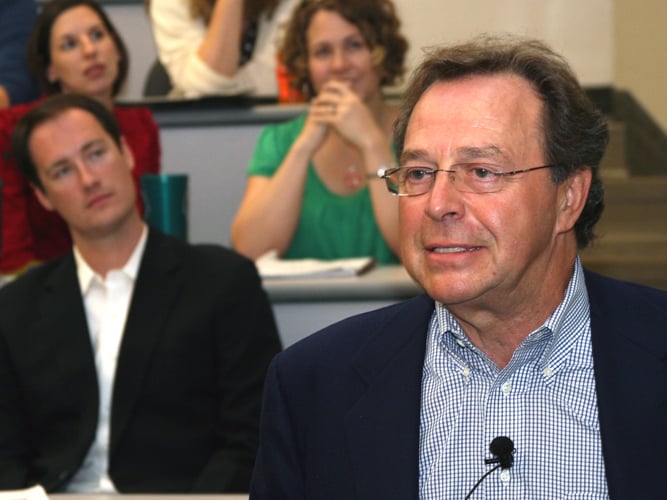
Rebels Need to Recruit Rebels
Advice for defectors from ING Direct
Corporate rebels who want to make a difference in society with game-changing enterprises need to focus on creating sustainable value for their customers, ING Direct Chairman and President Arkadi Kuhlmann said at Thundebird School of Global Management in Glendale, Ariz.
“Find a way to connect with your customers to create a value machine,” said Kuhlmann, a Canadian entrepreneur who brought ING Direct to the United States in 2000.
He spoke to an audience of about 100 students, faculty and staff at the invitation of the Thunderbird Finance Association led by Professor F. John Mathis, Ph.D., and students in his investment banking class. Afterward, Kuhlmann signed copies of his new book, “The Orange Code: How ING Direct Succeeded by Being a Rebel with a Cause.”
Kuhlmann said game changers such as Google, Dell, Wal-Mart, Starbucks and eBay all generate word-of-mouth marketing by giving their customers something new that creates value for society. He said that was his mission when he took on the big New York banks with ING Direct.
While traditional banks focus their marketing efforts on selling consumer debt, Kuhlmann decided to focus his efforts on leading America back to savings. He knew the message would difficult to sell because big spenders often generate more buzz than big savers — even when they’re suffocating in debt. “Trying to tell Americans to save their money is a tough chore,” he said.
But Kuhlmann had at least one thing working in his favor.
“Saving money is inherently good,” he said. “Watching your savings grow is a habit that leads to happiness.”
He said the dot-com bust that rocked the economy shortly after ING Direct moved to the United States helped advance his battle cry. And the current recession has given another boost to the idea of saving before spending.
“Picking up these waves is actually pretty helpful,” he said.
Just six months after the U.S. launch, ING Direct had 100,000 customers and $1 billion in deposits. By the end of 2008, the business had grown to include 7 million customers and $65 billion in deposits.
Kuhlmann, a self-proclaimed rebel and misfit, shared advice for others like himself who want to prove the corporate world wrong by taking an unconventional path to success
Start fresh
For starters, he said rebels with a cause need to study their chosen industry and look for market gaps. “You cannot do things people are already doing,” he said. “You need to start with a clean sheet of paper.”
The United States had more than 9,000 banks when ING Direct started its online operations, but none reached out to “Main Street” Americans as partners in saving. Kuhlmann said the banking industry missed marketing opportunities and failed to integrate new technology into their operations.
ING Direct filled these gaps with edgy marketing campaigns and an online bank that promised customers higher returns on their savings and checking accounts and lower interest rates on their loans.
Keep it simple
As the company began to grow, Kuhlmann kept his message simple with minimal fine print, limited consumer options and a straightforward Web site design that looks more like a video game than a banking portal.
He said people who buy a new car don’t start by reading the manual in the glove box. Instead they get behind the wheel, crank up the stereo, and take the car for a test drive. The same approach works at ING Direct.
“You don’t need to read a manual to do it,” Kuhlmann said.
Create value
On the issue of creating value for customers, Kuhlmann said most banks in New York do the opposite. “Screwing people with credit cards is bad,” he said. “Most Americans use credit cards, but they hate them.”
Savings accounts have the opposite effect. Kuhlmann said people may hate their jobs, their morning commutes or their ex-spouses, but everybody loves their savings account.
“It’s cool to save,” he said. “It builds self-esteem.”
Be authentic
Kuhlmann said another key for rebels who take on the corporate world is that they need to be real about it.
“Walk the talk,” he said. “Be authentic. Don’t pretend to be a rebel.”
Kuhlmann leaves little doubt about his own rebel status. He rides a Harley Davidson motorcycle, wears cowboy boots and carries a gun. And he chuckles as he compares big retail banks in New York to Darth Vader and the Death Star from “Star Wars.” (He is quick to point out that Luke Skywalker and the freedom fighters in the rebel alliance wear bright orange jumpsuits, the same trademark color used by ING Direct.)
Recruit rebels
Rebels who take on the corporate giants can’t succeed alone. Kuhlmann said they need to recruit like-minded rebels to their cause.
“If you’ve been rejected a lot in your daily life, it’s good training for this line of work,” he said. The only drawback to hiring rebels, Kuhlmann said, is that they quickly develop an appetite to go their own way and pursue their own causes.
“One measure of a good company is the number of people it spins off,” he said. “This is the biggest challenge for companies like Google.”
[This article has been reproduced with permission from Knowledge Network, the online thought leadership platform for Thunderbird School of Global Management https://thunderbird.asu.edu/knowledge-network/]





